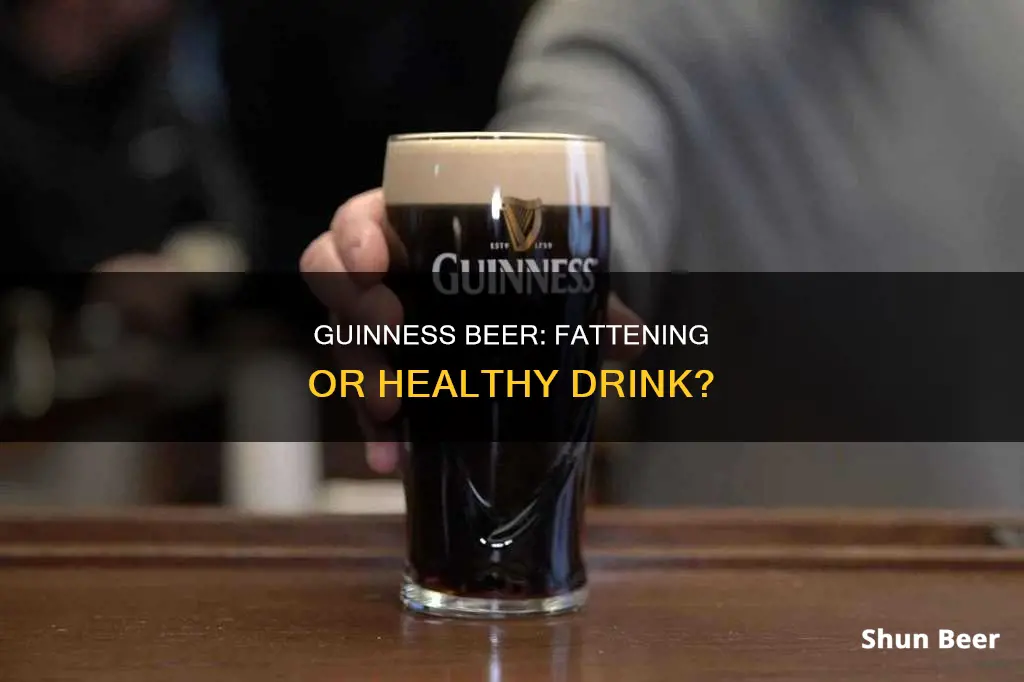
Guinness is a popular Irish beer known for its creamy texture and dark colour. Despite its reputation for being a heavy beer, Guinness has fewer calories than most non-light beers on the market. A 12-ounce serving of Guinness has 125 calories, only 15 more than the same serving of Bud Light. The beer's thick, creamy texture is achieved through a mix of carbon dioxide and nitrogen, with nitrogen bubbles being smaller, resulting in a smoother mouthfeel. So, is Guinness fattening? The answer is surprisingly no – in fact, it's one of the least calorific beers out there.
What You'll Learn

Guinness has fewer calories than most non-light beers
The perception that Guinness is a heavy beer may come from its creamy texture and dark colour. However, the nitrogenation process, which pairs nitrogen gas and carbon dioxide, gives Guinness its iconic velvety texture without adding extra calories. This is similar to how nitro cold brew coffee has a silkier texture than regular cold brew, but no additional calories.
Guinness also has the second-lowest carbs among beers and the lowest alcohol content. A Wisconsin study found that drinking one pint of Guinness a day could reduce blood clots and lower the risk of heart attacks, similar to the effects of aspirin. Additionally, a pint of Guinness contains 0.3mg of iron, and was once given to blood donors and new mothers to boost their iron intake.
While beer is often associated with weight gain and the "beer belly", Guinness has fewer calories than most non-light beers and may offer some health benefits when consumed in moderation. However, it is important to note that alcohol provides empty calories and excessive drinking can lead to liver damage, cancer, and other health issues.
Guinness: The Healthiest Beer Option?
You may want to see also

It has the second-lowest carbs of beers
Guinness has a reputation for being a heavy beer, but this is not entirely accurate. While it has a creamy texture and a rich, caramel-tinged flavour, it is not as calorific as one might think. In fact, a 12-ounce (330 ml) serving of Guinness contains just 125 calories, which is only 15 more than the same serving of Bud Light. This is because alcohol is the main source of calories in beer, and Guinness has a relatively low alcohol content, with an ABV of 4.2% or 4.3%, while most popular lager beers in the US are at least 5%.
Not only is Guinness lower in calories than many other beers, but it also has the second-lowest carbohydrates (or carbs) content among beers. A 12-ounce serving of Guinness contains 10 grams of carbs, which is lower than most other beers, including popular "dad beers" like Miller Lite, Budweiser, and Coors Light. This makes Guinness a good choice for those watching their waistline or trying to avoid the dreaded "beer gut".
The misconception that Guinness is a heavy beer may come from its dark colour and creamy texture. However, the dark colour actually comes from small amounts of roasted barley used in the brewing process, while the creamy texture is achieved by using a mix of carbon dioxide and nitrogen for carbonation, resulting in smaller bubbles and a smoother mouthfeel. So, while Guinness may look and feel heavier than other beers, it actually has a lower calorie and carb content.
In addition to being relatively low in calories and carbs, Guinness also has some potential health benefits. Beer is known to contain nutritional benefits such as antioxidants, B vitamins, fibre, silicon, and prebiotics, and Guinness is said to be one of the richer sources of these nutrients. Some studies have found that moderate beer consumption, up to one beer per day for women and two per day for men, is associated with a decreased risk of cardiovascular disease and overall mortality, as well as a possible increase in bone mineral density.
So, while Guinness may not be the healthiest beverage, it does have some nutritional benefits and is lower in calories and carbs than many other beers. This makes it a relatively better choice for those conscious of their weight or carb intake. However, it is important to remember that alcohol in general is not the best choice for a healthy diet, as it contains "empty calories" with no nutritional value.
Guinness Beer vs. World Records: What's the Difference?
You may want to see also

It has the lowest alcohol percentage
When it comes to the question of whether Guinness beer is fattening, one of the key factors to consider is its alcohol percentage. Alcohol is the main contributor to the calorie content of beer, and Guinness has a relatively low alcohol percentage compared to other beers.
Guinness, a popular Irish stout beer, has an alcohol content of 4.2%, which is lower than the average beer, which typically contains 5% ABV (alcohol by volume). This lower alcohol percentage translates to a lower calorie count. A 12-ounce serving of Guinness contains 125 calories, which is only slightly higher than a similar serving of a lighter beer like Bud Light.
The misconception that Guinness is high in alcohol may stem from its dark colour and creamy texture. However, the colour and sweetness of Guinness come from small amounts of roasted barley used in the brewing process, while its texture is achieved by using a mix of carbon dioxide and nitrogen for carbonation, resulting in smaller bubbles and a smoother mouthfeel.
The lower alcohol percentage in Guinness makes it a good choice for those looking to moderate their alcohol intake while still enjoying a beer. It's important to note that while alcohol content affects the calorie count, other factors also contribute to the overall nutritional value of a beer. Nevertheless, the relatively low alcohol percentage of Guinness is a factor to consider when assessing its fattening potential.
In conclusion, while alcohol is a significant factor in the calorie content of beer, Guinness, with its lower alcohol percentage, is not as fattening as one might assume. This, coupled with its moderate calorie count, makes Guinness a relatively better option compared to beers with higher alcohol percentages. However, it's always important to consume alcohol in moderation and prioritise healthier alternatives for optimal health.
The Evolution of Guinness Beer: A Historical Perspective
You may want to see also

It's not gassy, so you don't get bloated
While beer is often associated with weight gain, Guinness may be an exception to this rule. Despite its creamy texture and dark colour, Guinness is surprisingly not as fattening as one might expect. In fact, it has been dubbed one of the least calorific beers available. A 330ml serving of Guinness contains just 125 calories, which is comparable to some lighter beers.
So, why is Guinness less likely to cause bloating than other beers? The answer lies in its carbonation process. Unlike most beers that solely use carbon dioxide for carbonation, Guinness uses a combination of carbon dioxide and nitrogen. Nitrogen bubbles are smaller than carbon dioxide bubbles, resulting in a smoother and creamier texture. This unique carbonation process gives Guinness its signature mouthfeel without the excessive gas often found in other beers.
The perception that Guinness is a heavy and filling beer is a common misconception. In reality, it has a relatively low alcohol content of 4.2% ABV, which is lower than the average beer. This is significant because alcohol is the main source of calories in alcoholic beverages. Therefore, the lower alcohol content of Guinness contributes to its lower calorie count.
Additionally, the dark colour and sweetness of Guinness come from small amounts of roasted barley, which have minimal impact on its calorie content. So, if you're looking for a beer that won't leave you feeling bloated, Guinness is a surprisingly good choice. Its smooth texture and lower calorie count make it a better option than many other beers on the market.
However, it's important to remember that while Guinness may be a better choice in terms of calorie content, excessive consumption of any alcoholic beverage can still lead to weight gain and other health issues. Drinking in moderation is always recommended.
Guinness Beer: Kosher Certification and Jewish Drinking Traditions
You may want to see also

It's high in iron
While Guinness beer is not a significant source of iron, containing only 0.3 mg of iron per pint, it can still contribute to the recommended daily intake of 9-18 mg. This is particularly important since most adults do not meet their recommended daily iron intake. In fact, Guinness was once given to post-operative patients, pregnant women, and people who had donated blood to help replenish their iron levels.
Iron is essential for the production of haemoglobin, which helps transport oxygen via red blood cells. By consuming Guinness, individuals can boost their iron levels, supporting healthy oxygen transport in the body.
In addition to its iron content, Guinness also offers other potential health benefits. It is relatively low in calories compared to other beers, with a 12-ounce serving containing 125 calories, only 15 more than Bud Light. The nitrogen and carbon dioxide used in carbonation give Guinness its creamy texture and contribute to a feeling of fullness, which may help reduce food cravings later.
Guinness also contains antioxidants, specifically flavonoids, which are known to reduce the risk of blood clots and promote heart health. Additionally, the beer's dark colour and sweetness come from roasted barley, which provides antioxidants, heart-healthy polyphenols, and B vitamins.
While Guinness may have some nutritional benefits, it is important to consume it in moderation. Excessive alcohol consumption can lead to negative health effects, including liver damage, increased risk of certain cancers, and decreased brain function. However, moderate consumption, defined as one drink per day for women and two drinks per day for men, may offer some health benefits, such as a reduced risk of cardiovascular disease and improved bone mineral density.
Guinness: A Beer or Not?
You may want to see also
Frequently asked questions
Guinness beer is not particularly fattening. A 12-ounce serving of Guinness contains 125 calories, which is only 15 more than the same serving of Bud Light. Guinness also has a low ABV of 4.2%, which means it is relatively low in calories.
Guinness beer is often perceived as fattening due to its creamy texture and dark colour. However, its use of nitrogen and carbon dioxide in carbonation results in smaller bubbles and a smoother mouthfeel, which contributes to its perceived creaminess.
Guinness beer is one of the least calorific beers on the market. When compared to popular "dad beers", such as Miller Lite, Budweiser, and Pabst Blue Ribbon, Guinness often contains fewer calories and carbs.







